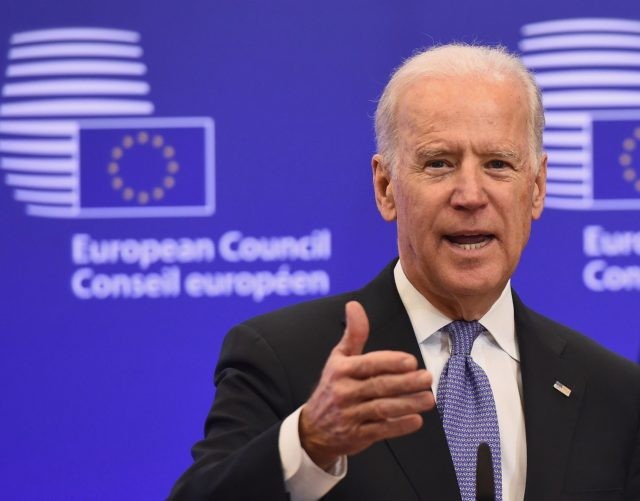The European Union is seeking ways to reset trans-Atlantic ties between the bloc and the United States under the assumption that globalist-minded former vice president Joe Biden ascends to the White House.
Eurocrats met in Brussels on Monday to discuss strategies for working with a possible Biden presidency, on issues such as ‘Build Back Better’ green agenda issues and the Chinese coronavirus pandemic.
“With Joe Biden´s election as the new American president, there are a lot of major opportunities that we as Europe want to take,” said German Foreign Minister Heiko Maas.
The Chair of the meeting, EU foreign policy chief Josep Borrell said per the Associated Press that the goal of the gathering was to establish “a new, refreshed start of our engagement with the U.S.”
In a document released last week, entitled A New EU-U.S. Agenda for Global Change, the EU Commission said that it would seek to “reinforce and reform the World Health Organization” with Biden.
Earlier this year, President Trump removed the United States from the UN body over concerns that the W.H.O. was compromised by its close ties with the Chinese Communist Party.
“The EU wants to work with the US to ensure funding for the development and equitable global distribution of vaccines, tests and treatments, develop joint preparedness and response capacities, facilitate trade in essential medical goods, and reinforce and reform the World Health Organization,” the Commission said.
Delingpole: The Green Agenda IS the Great Reset https://t.co/4c9RkNjx7S
— Breitbart London (@BreitbartLondon) November 24, 2020
There are also hopes in the EU that a Biden presidency would see the United States rejoin the Paris Climate accords, fulfilling a campaign promise of the 77-year-old Democrat.
Echoing the language of proponents of the Great Reset, the EU called for the creation of a “transatlantic green agenda”. The continental power bloc claimed that while the Chinese coronavirus continues to pose “significant challenges” the issues of “climate change and biodiversity loss remain the defining challenges of our time”.
“They require systemic change across our economies and global cooperation across the Atlantic and the world,” the Commission said.
The plan would see the United States alongside European countries commit to net-zero emissions by the year 2050, as well as massive investments in so-called green energy.
The EU also claimed that the bloc and the United States share a “fundamental interest” in promoting democracy throughout the world and upholding human rights. Yet, the document did not point to China, which is one of the world’s most egregious offenders of human rights, as well as one of the least democratic.
Last week, figures from Eurostat revealed that amidst the global pandemic caused by the failures of the Chinese state, the communist nation has overtaken the United States as the EU’s top trading partner.
During the first nine months of this year, 425.5 billion euros ($514 billion) in trade was exchanged between the China and the European Union, some 13 billion more euros than was exchanged with the United States.
Globalists Salute: Angela Merkel, EU President Hail Future ‘Cooperation’ With Joe Biden https://t.co/xcQOogEcwe
— Breitbart London (@BreitbartLondon) November 9, 2020
Speaking ahead of the November presidential election, the former U.S. ambassador to the EU and Biden campaign advisor, Anthony Gardner, said that if elected Biden would announce a “declaration of support for the European Union”.
“If Biden is elected, I believe quickly, perhaps first day, [there will be a] declaration of support for the European Union, declaration of support for European integration, declaration of support in favour of NATO, the lynchpin of the trans-Atlantic alliance, which has been weakened because of this administration’s policies,” Gardner said
In stark contrast to Joe Biden, President Trump has been frequently at odds with globalist Eurocrats, in particular over the failures of many European NATO countries — Germany in particular — to pay for their fair share in defence spending.
The latest figures from the military alliance showed that Germany only spent 1.38 per cent of its GDP on defence in 2019, far below the required 2 per cent that Europe’s largest economy pledged to hit in 2014.
Pressure from President Trump was credited, however, by the Secretary-General of the alliance Jens Stoltenberg, who said in 2019 that the “clear message” from Trump helped secure $100 billion more investment from NATO members.
Joe Biden Rushes to Embrace U.N. and Burnish Globalist Ambitions https://t.co/BwJ6p37594
— Kyle Olson 🇺🇸 (@kyleolson4) December 2, 2020
Follow Kurt Zindulka on Twitter here: @KurtZindulka

COMMENTS
Please let us know if you're having issues with commenting.